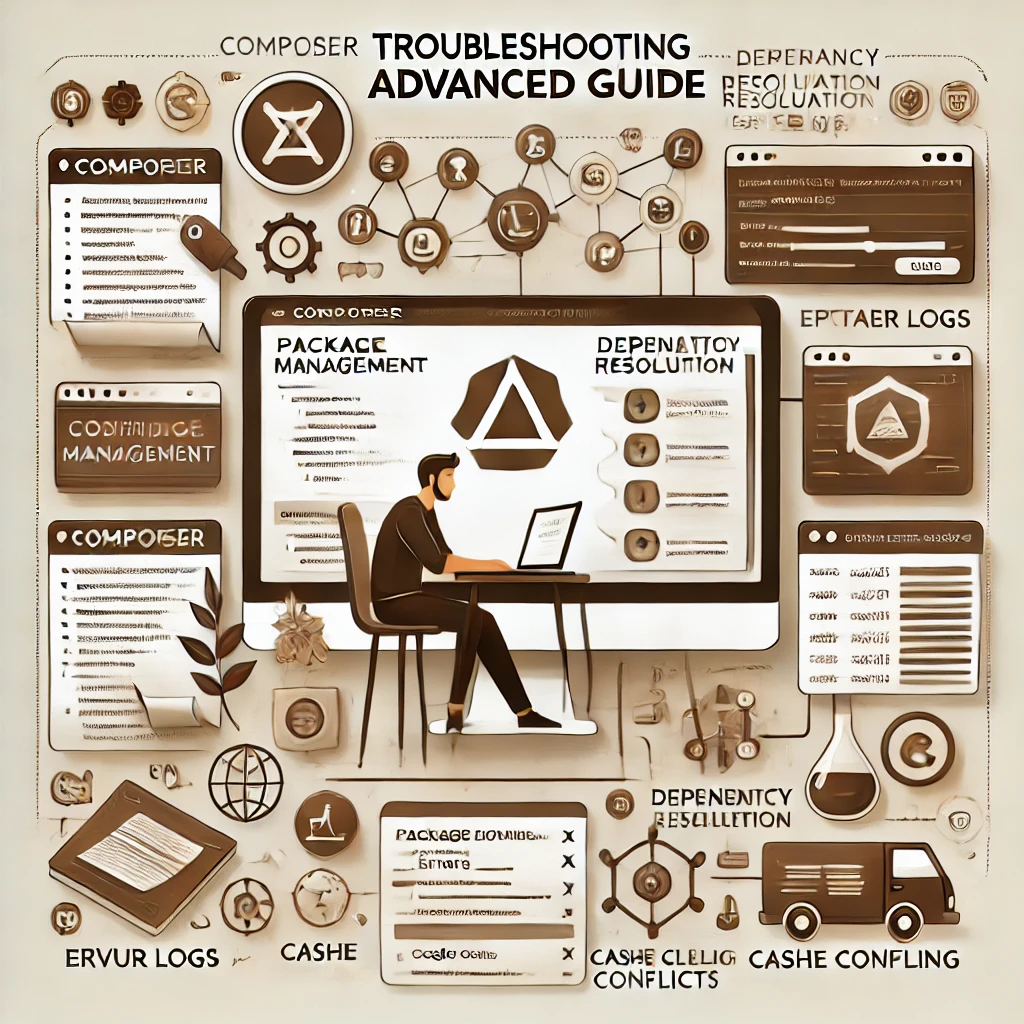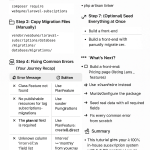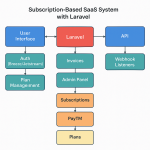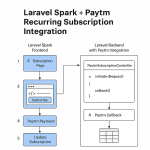Limited Time Offer!
For Less Than the Cost of a Starbucks Coffee, Access All DevOpsSchool Videos on YouTube Unlimitedly.
Master DevOps, SRE, DevSecOps Skills!

Composer is an indispensable tool for PHP developers, designed to handle dependencies and manage packages with ease. It streamlines the integration of libraries and frameworks, automating what would otherwise be a manual and error-prone process. However, as projects scale and configurations become more complex, Composer can encounter various issues, some straightforward and others more intricate.
In large-scale applications or projects with numerous dependencies, Composer’s limitations and potential errors often surface, ranging from version conflicts to memory limitations, connectivity issues, and configuration mishaps. These challenges can disrupt development workflows and lead to hours of debugging, especially when the root cause isn’t immediately apparent.
This advanced troubleshooting guide dives deep into the most common and complex issues faced when working with Composer, equipping you with detailed solutions and best practices for overcoming these challenges. From managing intricate dependency conflicts and navigating version constraints to optimizing Composer’s performance and handling network-related errors, this guide covers it all.
Whether you’re working on enterprise-grade applications or managing a team of developers who rely on Composer, understanding how to troubleshoot and resolve Composer’s more elusive issues is crucial. This guide not only addresses specific problems but also emphasizes proactive configuration tips and optimizations to keep your dependency management smooth and efficient. Through this comprehensive overview, you’ll gain the confidence and knowledge to troubleshoot Composer effectively, ensuring your development process remains streamlined and productive.
What are the Composer Troubleshooting Advanced Guide?

Composer, a PHP dependency manager, simplifies handling package dependencies but can encounter various issues, especially in advanced configurations and environments. This guide addresses some of the most complex troubleshooting scenarios, offering a deep dive into solutions and explanations for each.
Common Composer Errors and Solutions
a. composer.lock and Dependency Conflicts
- Issue: Conflicting dependencies arise when multiple packages require different versions of the same dependency.
- Solution: Delete the
composer.lockfile and runcomposer updateto refresh the lock file with the latest compatible versions. If the issue persists, inspect thecomposer.jsonfile and update specific packages manually to compatible versions.
b. composer install vs. composer update
- Issue: Running the wrong command can result in unexpected package updates or failures to install.
- Solution:
- Use
composer installto install packages as per thecomposer.lockfile, ensuring the exact versions are used. - Use
composer updateto refresh dependencies incomposer.lockbased on the latest compatible versions incomposer.json.
- Use
Composer Configuration Issues
a. Incorrect composer.json Syntax
- Issue: Syntax errors in
composer.jsonlead to parse errors. - Solution: Validate the
composer.jsonusing:
composer validateCorrect any syntax errors, especially in require and require-dev fields.
b. Misconfigured Path Repositories
- Issue: Using path repositories in local environments can cause conflicts in production.
- Solution: Ensure that paths are correctly configured for local-only settings. Disable path repositories in production environments by conditionally loading configurations.
Dependency Management Problems
a. Outdated Dependencies
- Issue: Outdated dependencies can result in compatibility issues.
- Solution: Use
composer outdatedto list packages that need updating. For major updates, review the change logs to assess compatibility and run:
composer update <package-name>b. Package Version Conflicts
- Issue: Multiple packages requiring incompatible versions of a dependency.
- Solution: Explicitly set the version constraints for dependencies in
composer.json. Use version constraints like^,~, or exact versions to control the allowable range.
Proxy and Firewall Issues
a. Behind a Proxy or Firewall
- Issue: Composer fails to connect to repositories when behind a proxy or firewall.
- Solution:
- Set proxy settings using:
export HTTP_PROXY=http://proxy.example.com:port- For Composer itself:
composer config -g http-proxy http://proxy.example.com:portSSL Certificate Issues
- Issue: SSL errors when fetching packages.
- Solution: Set
disable-tlsas a temporary workaround but use it cautiously:
composer config -g disable-tls trueConsider updating your CA certificates to resolve SSL issues without disabling TLS.
Performance Optimization and Memory Limits
a. PHP Fatal error: Allowed memory size of ... exhausted
- Issue: Composer runs out of memory during operations.
- Solution:
- Increase PHP memory limit:
php -d memory_limit=-1 composer.phar install- Optimize the
composer.jsonautoload section by specifying precise directories for autoloading.
b. Speeding Up Composer Installations
- Issue: Slow download and installation times.
- Solution:
- Enable parallel downloads:
composer config -g process-timeout 2000
composer config -g github-oauth.github.com <your-token>- Use
composer install --prefer-distto download zip files instead of cloning repositories.
Autoloading and Class Mapping Issues
a. Missing Class Errors
- Issue: Composer cannot locate classes after updating dependencies.
- Solution:
- Run
composer dump-autoloadto rebuild the autoload files.
- Run
composer dump-autoload --optimize- Use the
--optimizeflag for optimized autoloading in production:
b. Issues with PSR-4 Autoloading
- Issue: Improperly configured namespace paths in
composer.jsoncan cause loading issues. - Solution: Verify the PSR-4 mappings in
composer.jsonand correct any mismatched namespaces.
Handling PHP Version Conflicts
a. PHP Version Compatibility Issues
- Issue: Composer requires a specific PHP version that conflicts with your system version.
"config": {
"platform": {
"php": "7.4.0"
}
}- Solution:
- Use
platformsettings incomposer.jsonto specify a PHP version: - Alternatively, switch PHP versions using tools like
phpenvorphpbrew.
- Use
b. Incompatible PHP Extensions
- Issue: Missing or incompatible PHP extensions can prevent package installations.
- Solution:
composer check-platform-reqs- Check required extensions with:
- Install missing extensions or disable unnecessary ones by editing
php.ini.
Custom Composer Scripts and Hooks
a. Failing Composer Scripts
- Issue: Custom scripts fail due to missing dependencies or incorrect commands.
- Solution: Verify dependencies are installed before executing scripts, and use absolute paths when needed. Use Composer event hooks (
pre-install-cmd,post-install-cmd) to add custom commands.
b. Using Composer for CI/CD Automation
- Issue: Composer’s default behavior may not align with CI/CD needs.
- Solution:
- Use
composer install --no-dev --optimize-autoloaderfor production deployments. - Cache dependencies across builds to reduce installation time in CI/CD pipelines.
- Use
Composer Authentication Issues
a. GitHub Token Authentication
- Issue: Authentication failures when fetching private packages from GitHub.
- Solution:
- Generate a GitHub token and configure Composer:
composer config -g github-oauth.github.com <token>b. Handling Private Repositories
- Issue: Accessing private repositories in Composer can result in authentication issues.
- Solution:
- Use SSH keys for authentication or configure Composer to use the
auth.jsonfile for storing credentials securely.
- Use SSH keys for authentication or configure Composer to use the
Debugging Composer Using Verbose Output
When Composer behaves unexpectedly, use the -vvv (very verbose) flag to gain detailed insights:
composer install -vvvThis command provides extensive logging information, making it easier to pinpoint issues in dependency resolution, network requests, and autoloading.
Why Composer Troubleshooting is Important?

Composer troubleshooting is crucial for several reasons, especially in dynamic and evolving PHP projects where managing dependencies is central to maintaining a stable and efficient codebase. As projects grow and rely on multiple libraries, even minor issues in Composer can create significant disruptions. Here’s why Composer troubleshooting is not just beneficial but essential:
- Ensures Stable Dependencies:
- With Composer, your PHP application can depend on numerous libraries, each with its own set of dependencies. If these are not managed correctly, conflicts and version mismatches can arise, potentially causing application failures or unexpected behavior.
- Effective troubleshooting ensures that dependencies remain stable, compatible, and correctly installed, maintaining your application’s reliability and functionality.
- Prevents Development Delays:
- Composer issues can halt development unexpectedly, especially if they arise in critical phases of the development lifecycle. For instance, a single unresolved version conflict can prevent your application from updating necessary dependencies, delaying new feature rollouts or critical fixes.
- Proficient troubleshooting minimizes these delays, keeping development on schedule and ensuring that the team can proceed without unnecessary interruptions.
- Improves Performance and Resource Optimization:
- Issues like memory exhaustion or slow package installations can slow down the Composer process, affecting the overall development workflow and consuming valuable system resources.
- By troubleshooting these performance-related issues, developers can optimize Composer’s efficiency, allowing faster installations and updates, and reducing resource overhead.
- Enhances Production Reliability:
- Dependency mismanagement and version inconsistencies can lead to application failures in production, where even small errors can have large impacts on users and business outcomes.
- Proper troubleshooting ensures that Composer functions reliably in production environments, enabling secure, stable deployments and minimizing the risk of runtime failures caused by dependency issues.
- Supports Continuous Integration/Continuous Deployment (CI/CD):
- Many development teams use Composer in automated CI/CD pipelines, where errors in dependency management can disrupt the entire build and deployment process.
- Troubleshooting Composer in CI/CD environments is essential for maintaining a seamless pipeline, ensuring smooth, automated deployments, and supporting a DevOps approach to development.
- Facilitates Collaboration Across Teams:
- In collaborative projects, each team member may work with different environments or have unique configurations. Composer issues, such as incompatible
composer.jsonsettings or missing dependencies, can prevent team members from effectively syncing their work. - Addressing these issues with proper troubleshooting practices helps create a consistent development environment for all collaborators, reducing friction and improving productivity.
- In collaborative projects, each team member may work with different environments or have unique configurations. Composer issues, such as incompatible
- Enables Better Dependency Management:
- Composer’s dependency management is one of its strongest features, but it requires careful handling to avoid common pitfalls like outdated libraries, security vulnerabilities, or conflicting packages.
- Proactive troubleshooting in Composer helps manage dependencies more effectively, ensuring that the codebase is secure, up-to-date, and free from redundant or incompatible packages.
By mastering Composer troubleshooting, developers and teams can maintain a smoother, more efficient development process, minimize downtime, and uphold a higher standard of quality and reliability in their PHP applications.




